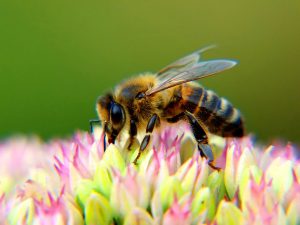Crop farmers are well acquainted with pests. They come in a variety of forms — insects, weeds, fungus, bacteria, and viruses. And left unchecked, these nuisances can decimate plants, fields, and entire farms. Luckily, we live in a time when science and technology have developed numerous effective and safe ways to combat them.
But not everyone appreciates our pest-solution innovations, especially pesticides. And those voices had something to celebrate this past week: Dave Goulson’s book, Silent Earth, was released.

Goulson touts his theory that the global population of insects is dwindling so dramatically that we’re facing an armageddon. To Goulson, modern life is to blame, and eliminating pesticides is the only logical answer.
Related: Are honey bees endangered? Here’s the truth of the matter
The insect apocalypse isn’t a new idea. It’s been around for a couple of decades, though it’s captured more interest over the past three or four years. And Goulson is often quoted talking about the impending doom and the evils of conventional agriculture practices.
For his part, Goulson presents like a legitimate and trustworthy scientist. He’s a professor in biology at England’s University of Sussex, and he’s written several books about bees.
But it won’t come as any surprise that Goulson isn’t an unbiased and impartial researcher. He’s a trustee for the Pesticide Action Network UK, an activist organization that strives to reduce the use of “hazardous” and “chemical” pest control. Worse, some circles consider Goulson a “scientist for hire.” In other words, his studies elicit the results his clients want.
The good news is that Goulson is wrong. The surveys and studies he’s conducted and relies upon are flawed and incomplete, to say the least. Fortunately, scientist Matthew Moran and his hand-selected team published a comprehensive study in 2020 that challenged Goulson’s conclusions. Moran’s approach took raw data spanning decades for various insects in North America. Guess what? They found no significant change in population.
Unfortunately, “all fine here” doesn’t garner as many clicks as “the world is ending.”

Maybe I’m being too hard on Goulson. After all, he’s from the UK, so maybe he doesn’t know that U.S. farmers’ use of pesticides has changed significantly since the 1960s. In fact, we’ve reduced the amount applied per acre by almost 60 percent. We’ve slashed pesticide toxicity by 98 percent. And we’ve curtailed pesticide persistence in the environment by half. Pesticide use peaked in 1972, and it decreased most years afterward through 2008.
And here’s the more important thing: We have really, really good reasons for using those pesticides. For example, the Weed Science Society of America worked with Kansas State University to determine what would happen if weeds were left uncontrolled in North America’s corn and soybean fields. They determined it would slash yields by 50 percent and result in annual economic losses of $43 billion. Food security nationwide would be devastated.
Pesticides also help promote soil-friendly production practices. The development of herbicide-resistant crops have made no-till and cover crops available to more farms across the country. These methods promote soil health and reduce erosion. Yet Goulson is opposed to genetically modified crops solely because he doesn’t like the corporations that have created them.

Goulson and his friends don’t care about nuanced conversation. Instead they promote a blind agenda to eliminate the use of all pesticides, and redirect agriculture to organic production. The irony is that Goulson admits organic farming has significantly lower yields and also uses pesticides at levels toxic to insects.
Goulson suggests we can overcome those problems by simply reducing or eliminating food waste. That’s optimistic. But it would still cause our food supply to shrink and our food prices to skyrocket. I’m not sure those already struggling from hunger and malnourishment will find his ideas comforting.
And all of this to prevent a problem that doesn’t exist, at least not in North America. Silent Earth is nothing more than an alarmist piece of propaganda filled with half-truths and disinformation. The insect apocalypse isn’t imminent.
Our insects are fine. Our farms are fine. It’s all fine.
Amanda Zaluckyj blogs under the name The Farmer’s Daughter USA. Her goal is to promote farmers and tackle the misinformation swirling around the U.S. food industry.



